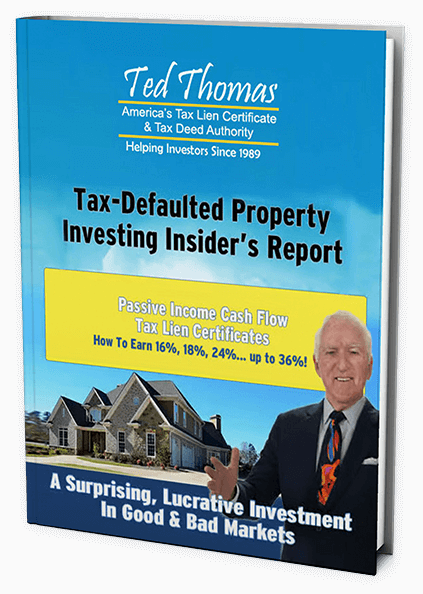What is the difference between tax lien vs. tax deed investing? There’s a big difference between tax liens and tax deeds, and each tends to attract different types of investors.
You want to ensure your information is correct before committing to real estate investments to discover the right investment vehicle for you.
Keep reading to find out more about:
- What is a tax lien
- What is a tax deed
- The difference between a tax lien and a tax deed
Table of Contents
What Is A Tax Lien?
Tax liens are imposed, by law, upon a property to secure tax payments. They can be charged for taxes owed on real property, personal property, income taxes, or other taxes.
When you purchase a tax lien certificate, you are paying someone else’s delinquent taxes. Why would you want to do this? The reason is because you can earn an exceptionally high rate of return.
Tax lien certificates pay generous interest rates. For example, the state of Arizona pays up to 16%. Florida pays up to 18%, and in Illinois, you could earn up to 36%. Compare that with the rate banks are paying on certificates of deposit. There’s no contest.
When you invest in a tax lien, you are not purchasing the property. The property owner remains on the property and has the opportunity to pay the tax lien and the penalty to redeem the certificate.
When the property owner pays the county, the county will then pay you back your initial investment plus the high rate of interest. The vast majority of property owners will redeem the certificate.
Are tax liens a safe investment?
While most high-yielding investments are risky, tax lien investing is low risk because tax liens are government-backed and secured by real estate. If the property owner does not redeem the certificate, the investor who holds the certificate may foreclose on the property.
What Is A Tax Deed?
A tax deed is a legal document granting ownership of a property to a government body when the property owner fails to pay the property taxes.
When you purchase a tax deed, you are buying the property outright.
In a tax deed state, the county treasurer will seize tax-delinquent real estate, evict the property owner, and sell the property at a tax deed auction. The highest bidder wins.
Since the treasurer only wants the tax revenue rather than more real estate, tax deed properties are sold for hefty discounts. The bidding starts near the amount of the unpaid property taxes, 10 cents, 20 cents, or 30 cents on the dollar of the tax-assessed value of the property.
Tax Lien vs. Tax Deed
What is the difference between a tax lien and tax deed investing?
Tax liens on a property are similar to tax deeds, and both are sold at public auctions and can be purchased online.
However, tax deeds transfer property ownership to a new party, whereas tax liens are legal claims against the property when the taxes are not paid.
What is the difference between tax lien and tax deed investors?
A tax lien certificate is a secure and predictable high-yielding investment with minimal risk involved. Tax liens appeal to investors who want to earn passive income at rates of return that outpace inflation.
They also appeal to investors with more limited capital since tax lien certificates are sold in a wide range of amounts to suit every budget.
Tax deeds, on the other hand, attract entrepreneurs who want to make large profits quickly. Due to the generous profit margins inherent in a tax deed property, a knowledgeable investor who buys and resells tax deed real estate can make a considerable sum from a single transaction.
Doing Your Homework on Tax Liens and Tax Deeds
It is essential to do your real estate homework on a property you want to invest in to determine if you are getting into a tax lien or a tax deed. Both offer an excellent investment opportunity, but one might be a better option for you than the other.
Luckily, Ted Thomas has expansive knowledge of this subject matter and can help you determine the best approach for you.
Learn More About Tax Liens and Tax Deeds
What is the difference between a tax lien and tax deed investing? In summary, both tax liens and tax deeds are meant to profit from tax-delinquent real estate but in entirely different ways.
A tax lien certificate is a passive investment that yields a high rate of return. The tax lien investor only acquires the property if the certificate is not redeemed.
Conversely, the tax deed investor purchases the actual property and can do so at a large discount since the bidding begins near the amount of the unpaid property taxes.
Click here to get started today!
Please browse our website for more information about this fantastic investment opportunity, and take advantage of our library of educational videos to start investing today!

Video Transcript For:
What Is the Difference Between Tax Lien vs. Tax Deed Investing?
Randy: Hey, thanks for joining us. I’m here with Ted Thomas, who, of course, is the Tax Lien Certificate and Tax Auction Authority. He knows this kind of stuff. And Ted, the question we have right now is, and we’ve been talking about tax liens, and I know there are tax deeds. What is the difference between a tax lien and a tax deed?
Ted: Wow, it’s a huge difference. All right, so a tax lien is nothing more than what I’m going to hold up right now. It’s just a piece of paper. The piece of paper is attached to the house, and anybody can pay the taxes on that house, and they will then own the certificate. Now, when you commit to pay, you have to pay to get your certificate back, all right? So that’s just a real simple –
Randy: Just to clarify, why would I want to pay taxes on somebody else’s house?
Ted: Because the return on the certificate is, it’s outrageous. For example, if you bought a tax lien certificate and, let’s say you bought it in the state of Illinois, you can earn all the way up to 36 percent on the amount of tax there, you can earn three percent a month, and the banks aren’t even paying one percent.
Randy: Okay.
Ted: All right, so different states pay different amounts. Florida pays 18 percent, in Arizona they pay 16 percent. So you earn a real generous rate of return on that certificate, and it’s a very benevolent investment. The people are going to stay in the property.
Ted (cont’d): Now, a tax deed investment. Now, this is an all together different game. Now, this is for the entrepreneurial people. This means when young people go to a tax deed auction when you go there, you’re going to raise your hand. You’re going to buy a property. But when you buy the property, they’re going to start the bidding at 10, 20, 30 cents on the dollar.
Ted (cont’d): Now, can you imagine a $100,000 property, and they start the bidding at just the back taxes? Now, why will they start just at the back taxes? The county doesn’t want the property, they don’t want it. So they’re going to discount it.
Ted (cont’d): They just want to collect the revenue. The county works on revenue, every month, they want revenue to pay the school teachers, to pay the fire department, to pay the police department. That’s what they want. They don’t want property, they already own all the property they want.
Ted (cont’d): So, in one case, it’s a piece of paper, in the other case, I’m not going to hold one up, but what if this was a house I was holding up? You get a house.
Randy: If you could hold up a house, you’d be the strongest guy in the world, Ted that would be outstanding, I’d like to see that, but.
Ted: Yeah, so you get the idea, so-
Randy: So, okay, I think I get it. That seems pretty simple. So, in both cases, the person, the owner, can’t pay their taxes, and in one state, the state’s going, “All right, you’ve got to get out. We’re taking your house.”
Randy (cont’d): And so as the investor, I’m going, and I’m literally buying their house versus the other states, they’ll say, “Okay, you can stay in your house.” And I’m paying their taxes for them while they stay in their house, okay, I understand a little better that’s.
Ted: Right, right.
Randy: And Ted’s been filling in on all this stuff, and there are some really neat investment opportunities in both these scenarios. And if you want to learn more, Ted the best place to go to is probably your website, huh?
Ted: Yeah, I’d say go to tedthomas.com and look up tax liens and look up tax deeds. And I do a number of minutes on that. We actually even show you examples. I’ve been doing this for over 25 years, teaching people, and I’m an investor.
Ted (cont’d): I’m not just a guy that’s here talking about it like on late-night television, I do this. I mean, I buy properties online, I buy in different states. I buy tax liens. I don’t do a lot in the tax lien arena because there’s a lot more profit in the tax deeds, and I’ll explain that as we go through.
Randy: Well, that’s great. Well, head there right now, Ted thomas.com and just, you can click on any video you want, and learn some more. So, hey Ted, thanks for sharing with us.




